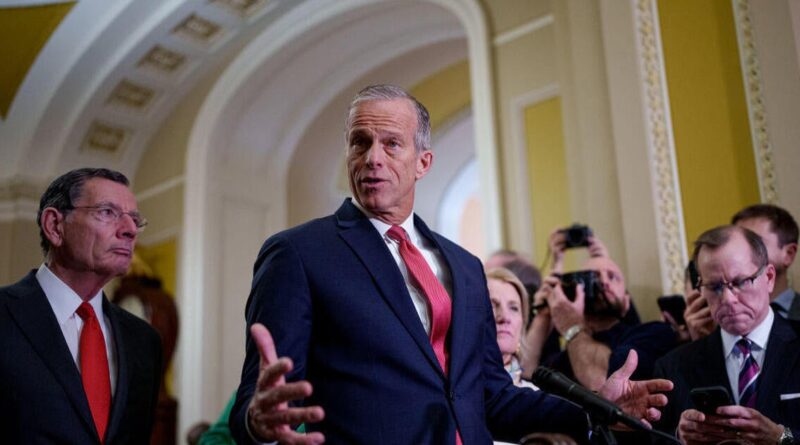Senate begins marathon “vote-a-rama” on GOP budget plan
Washington — Senate Republicans are forging ahead with a narrower budget proposal focused on defense, border security and energy priorities, despite President Trump’s decision on Wednesday to endorse a competing plan put forward by House Republicans.
The Senate began what’s known as a “vote-a-rama” on the GOP budget blueprint Thursday evening, in which senators can offer an unlimited number of amendments and force the chamber to cast vote after vote through the night. After the Senate exhausts all amendment votes, it will take a final vote on the budget resolution, which directs the committees to submit their proposed spending plans by March 7.
With a three-seat majority, Senate Republicans should ultimately have the votes to adopt the budget resolution, but the vote-a-rama gives Democrats the opportunity to force their GOP colleagues to go on the record on a host of politically dicey subjects. Sen. Patty Murray of Washington, the top Democrat on the Senate Appropriations Committee, said Wednesday that Republicans “better get ready for a late night and a long morning.”
Senate Majority Leader John Thune, a South Dakota Republican, defended the upper chamber’s decision while wishing House Republicans success in moving their resolution forward.
“I think he’s made it clear for a long time that he would prefer one big, beautiful bill, and we’re fine with that too,” Thune said Wednesday, referring to the president. “If the House can produce one big, beautiful bill, we’re prepared to work with them to get that across the finish line, but we believe that the president also likes optionality.”
The Senate’s budget resolution calls for increasing military spending by $150 billion and border security spending by $175 billion, but does not extend tax cuts enacted during Mr. Trump’s first term that expire at the end of the year. Senate Republicans want to address tax cuts in a second bill and make them permanent.
The House plan includes $4.5 trillion in tax cuts, raises the debt ceiling by $4 trillion and calls for at least $1.5 trillion in spending cuts. To appease conservatives, the House Budget Committee amended the resolution to make tax cuts dependent on spending cuts. If House committees don’t achieve at least $2 trillion in spending cuts, then tax cuts would be scaled back. Tax cuts would be increased if more than $2 trillion is slashed in spending.
Mr. Trump’s endorsement of the House’s one-bill approach was a victory for Speaker Mike Johnson, a Louisiana Republican, and took Senate Republicans by surprise. Johnson has been trying to keep pace with the Senate’s two-bill plan while navigating the demands of his divided Republican conference and razor-thin majority. House GOP leaders aren’t confident they can pass two bills with their narrow majority.
Senate Republicans, who want to move quickly on border and defense spending, deferred to their House counterparts for weeks to take the lead, but put out their own blueprint amid repeated delays in the lower chamber.
The Senate Budget Committee and House Budget Committee both passed separate plans last week. The House is in recess this week as the Senate works to adopt its resolution.
The chambers will have to eventually have to adopt identical budget resolutions to continue the reconciliation process and enact Mr. Trump’s agenda. The process allows Senate Republicans to pass the legislation with a simple majority.
Sen. Lindsey Graham of South Carolina, the chairman of the Senate Budget Committee, stressed Thursday ahead of votes that the Senate plan is the backup plan if the House blueprint fails, saying “I prefer what you’re doing to what we’re doing, but we’ve got to have a Plan B if you can’t get it done soon.” Graham also reiterated that senators want permanent tax cuts.
“To my House colleagues, we will all get there together if you can pass the one big, beautiful bill that makes the tax cuts permanent — not four or five years — then we’ll all cheer over here,” he said on the Senate floor. “Nothing would please me more than Speaker Johnson being able to put together the bill that President Trump wants. I want that to happen. But I cannot sit on the sidelines and not have a Plan B.”

